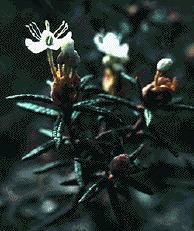

Common Name: St.
Jame's Tea, Marsh Tea, Swamp Tea, Hudson's Bay Tea
Genus: Ledum
Species: groenlandicum
Parts Used: leaves

The Labrador tea plant grows to be 4 to 5 feet. It will grow up straight in the southern latitudes of the tundra, but in the colder northern latitudes it will creep over the ground forming a carpet. It has woolly branches with narrow 1 to 2 inch leaves which are smooth on the upper side, with rusty hairs underneath. They droop slightly and edges are rolled under, and are a leathery green in color. At the ends of the branches are tiny clusters of white flowers with protruding stamen, which bloom in June and July.
The part used from this plant are the leaves, which were brewed for tea by Native Americans. The tea is very rich in vitamin C. They were also scattered among clothes to keep moths away. Branches kept with grain are said to keep mice away.
They are also used for medical purposes. Externally it was used for all kinds of skin problems. Tea was used for stomach and nerve ailments. A syrup was made from the tea to be used for coughs
They usually grow in wet meadows, bogs, and forest areas mostly in the lower latitudes of the tundra biome. Bees are attracted to the flowers, but animals don't eat them because they are said to be slightly poisonous.
Eliot T. 2000
Bibliography:
"Labrador Tea", http://www.rook.org/earl/bwca/nature/shrubs/ledum.html, (July 2000).
"Labrador Tea", http://www.botanical.com/botanical/mgmh/l/labrad01.html, (July 2000).